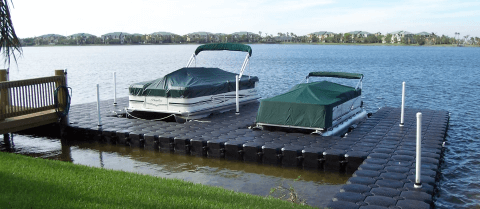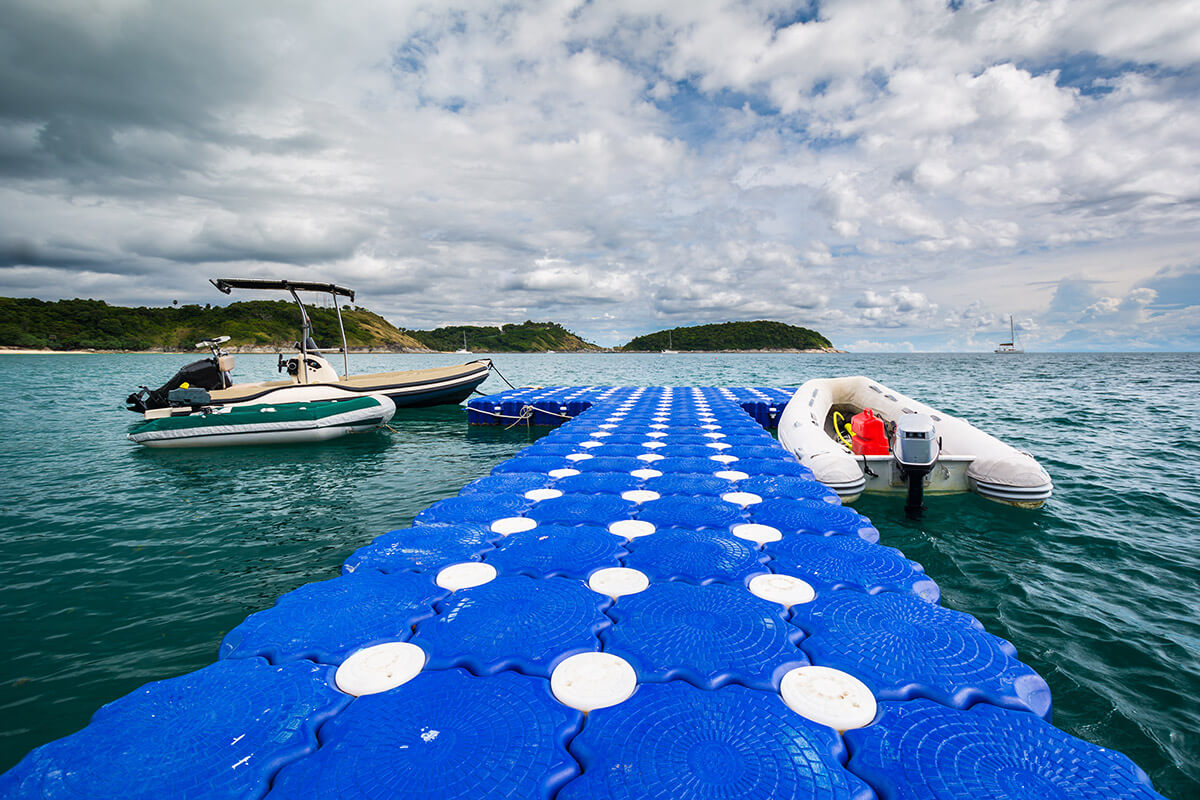Check out the Series Of Floating Dock Services Designed to Suit Every Seafarer's Needs
Floating Docks: The Ideal Selection for Versatile Water Accessibility
Floating docks existing an engaging option for a range of water access needs, offering versatility that goes beyond standard mooring choices. The modular nature of floating docks helps with customization, providing to details demands.
Benefits of Floating Docks
Floating docks deal many advantages that boost water gain access to for different applications. Their ability to rise and drop with altering water levels makes them specifically advantageous in settings with fluctuating trends or seasonal variants. This versatility ensures that vessels can conveniently moor without problem for the water's deepness, giving a reliable system for recreational, industrial, and industrial usages.
Additionally, floating docks are often created from resilient products that stand up to corrosion, making them appropriate for lasting use in aquatic atmospheres. Their setup is typically less intrusive than typical fixed docks, reducing the environmental effect and promoting quicker deployment (floating dock company). This adaptability allows for simpler moving or reconfiguration according to user needs or environmental modifications
Security is another key benefit; floating docks can give secure gain access to for individuals disembarking or boarding from boats and decrease the risk of crashes connected with unstable surface areas. They can be created to fit a range of accessories, such as cleats and fenders, improving capability. Generally, floating docks represent a reliable remedy for enhancing water accessibility across varied markets while promoting safety and ecological sustainability.

Kinds of Floating Docks
Different sorts of floating docks provide to different demands and atmospheres, each made with specific attributes to optimize performance. One of the most common kinds consist of modular docks, which include interlacing areas that allow for simple customization and growth. These docks are ideal for leisure use, as they can be tailored to fit different watercraft sizes and water problems.
Another preferred option is the stationary floating dock, which continues to be anchored in location however drifts with transforming water levels. floating docks. This type is particularly matched for locations with minimal tidal fluctuations, supplying secure accessibility for fishing or swimming. In addition, there are drive-on docks, which include a sloped style that enables watercrafts to conveniently drive on and off, making them suitable for personal watercraft and smaller vessels
For business applications, heavy-duty floating docks are readily available, constructed from strengthened products to endure considerable loads and severe marine atmospheres. Environmentally friendly floating docks use sustainable materials and layouts to decrease ecological influence, usually including functions like greenery to support neighborhood wildlife. Comprehending the various types of floating docks ensures that customers can choose one of the most proper option for their certain demands.
Installation Process Review
An effective setup of floating docks requires mindful preparation and attention to detail to guarantee ideal efficiency and safety and security. The preliminary step entails examining the you can find out more site problems, including water deepness, current, and possible challenges. This assessment notifies the selection of the proper dock materials and style tailored to special info the certain atmosphere.
Following, acquiring required permits is critical, as lots of jurisdictions have guidelines concerning building and construction on water bodies. The installment can proceed when approvals are protected. Begin by preparing the structure, which might involve anchoring systems or pilings customized to the dock kind and regional problems.
Following the foundation configuration, put together the dock areas according to supplier specifications. Make sure that all components are securely secured and straightened to withstand environmental anxieties. Placement the dock in the designated area, guaranteeing it is degree and secure.

Upkeep Tips and Finest Practices
After the installation process is complete, recurring upkeep plays a crucial role in guaranteeing the durability and functionality of floating docks. Routine evaluations should be conducted to recognize any indicators of wear, damages, or wear and tear - dock company. Check for any type of loose installations, fractures, or separation in the dock sections, as these can endanger architectural integrity
Cleaning the dock is essential to remove particles, algae, and various other accumulation that can impact its look and security. Utilize a mild stress clean periodically to maintain tidiness without creating damages to the surface area. Furthermore, using a protective sealer every few years can aid improve longevity and stand up to environmental wear.
Take notice of the mooring lines and anchors, guaranteeing they are complimentary and protected from corrosion. Change any type of degraded elements promptly to avoid hazards. Seasonal modifications might also be necessary; throughout extreme weather problems, reinforcing the dock or repositioning can stop damage.
Applications for Floating Docks
Floating docks offer a plethora of applications, dealing with both industrial and recreational needs. In leisure setups, they give seamless accessibility to rivers for activities such as boating, angling, and swimming. Their flexible nature permits installment in differing water levels, making sure secure and safe accessibility no matter tidal fluctuations.
Readily, floating docks are additional hints essential for marinas and waterfront services. They facilitate the docking of vessels, enabling reliable unloading and packing of goods. Their modular layout permits easy expansion or reconfiguration to fit changing business demands, making them excellent for watercraft rentals, trip operations, or angling charters.
Furthermore, floating docks are used in ecological applications such as water study and environment reconstruction. They can act as platforms for scientific researches, monitoring water quality, or conducting wildlife studies without disturbing sensitive ecological communities.
In commercial contexts, floating docks are utilized in building projects, giving accessibility to hard-to-reach areas for tools and personnel. Their adaptability, durability, and marginal influence on the setting make them an ideal choice for a wide array of applications, improving both performance and availability in various water-based settings.
Verdict
Finally, floating docks stand for an ideal service for diverse water accessibility needs, owing to their adaptability, resilience, and modular style. These structures assist in risk-free mooring for different applications while minimizing ecological effect during installation. The lowered upkeep demands further improve their functionality. Floating docks serve as a useful property for recreational, business, and environmental projects, guaranteeing trusted accessibility to rivers and promoting lasting methods in aquatic settings.
Floating docks existing a compelling solution for a selection of water gain access to needs, using flexibility that goes beyond traditional mooring choices.Floating docks deal numerous benefits that improve water gain access to for various applications. In general, floating docks stand for a reliable service for enhancing water access across diverse sectors while advertising security and ecological sustainability.
An additional preferred choice is the stationary floating dock, which continues to be anchored in area but drifts with altering water degrees.In final thought, floating docks represent an optimal service for diverse water accessibility needs, owing to their adaptability, toughness, and modular design.